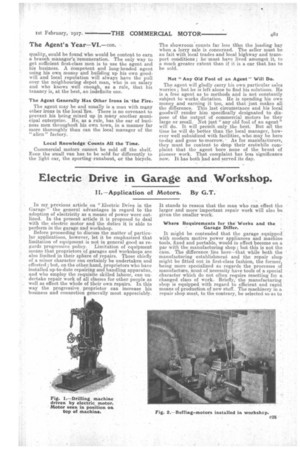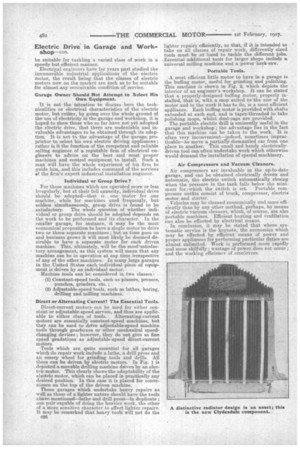Electric Drive in Garage and Workshop.
Page 5

Page 6

If you've noticed an error in this article please click here to report it so we can fix it.
IL —Application of Motors. By G.T.
In my, previous article on "Electric Drive in the Garage the general advantages in regard to the adoption of electricity as a means of power were outlined. In the present article it is proposed to deal with the electric motor and the duties it is able to perform in the garage and workshop.
Before proceeding to discuss the matter of particular applications, however, let it be emphasized that limitation of equipment is not in general good as regards progressive policy. Limitation of equipment means that proprietors of garages and workshops are also limited in their sphere of repairs. Those chiefly of a minor character can certainly be undertaken and effected ; but, on the other hand, proprietors who have installed up-to-date repairing and handling apparatus, and who employ the requisite skilled labour, can undertake repair work of all classes for other people as well as effect the whole of their own repairs. In this way the progressive proprietor can increase his business and connection generally most appreciably.
It stands to reason that the man who can effect tho larger and moreimportant repair work will also be given the smaller work.
Where Requirements for the' Works and the Garage Differ.
It might be contended that the garage equipped with modern motive power appliances and machine tools, fixed and portable, would in effect become on a par with the manufacturing shop ; but this is not the case. The difference lies here—that while both the manufacturing establishment and the repair shop might be fitted out in first-class fashion, the former, -being. more specialized as regards the processes of manufacture, must of necessity have tools of a special character which do not often require resetting for a changed class of work.. -Briefly,' the manufacturing shop is equipped with regard to efficient and rapid means of production of new stuff. The machinery in a repair shop must, to the contrary, be selected so as to
Electric Drive in Garage and Workshop—con
he suitable for tackling a varied class of work in a speedy but efficient manner. Electrical engineers have for years past studied the innumerable industrial applications of the electric motor, the result being that the classes of electric motors now on the market are such as to be suitable I Or almost any conceivable condition of service.
Garage Owner Should Not Attempt to Select His Own Equipment.
It is not the intention to discuss here the technicalities or electrical characteristics of the electric motor, but rather, by going over the whole ground of i the use of electricity n the garage and workshop, it is hoped to show those who so far have not yet adopted the electric drive, that there are undeniable and invaluable advantages to be obtained through its adoption. It is not to the advantage of the -garage, proprietor to select his own electric driving appliances ; rather is it the function of the competent and reliable selling engineer of a reputable firm of electrical en-gineers to advise on the best and most proper machines and control equipment to install. Such a man will have the whole experience of his firm to guide him, and this includes command of the services af the firm's expert industrial installation engineer.
Individual or Group Drive?
For those machines which are operated more or less irregularly, -but at their full capacity, individual drive
should be adopted—that one motor for one machine, while for machines used frequently, but seldom simultaneously, group drive is found to be satisfactory. The whole question of whether individual or group drive should be adopted depends on the work to be performed and its character. In the smaller garage, for instance, it may be the most economical proposition to have a single motor to drive two or three separate machines ; but as time goes on and business grows it will most likely be deemed desirable to have a separate motor for each driven machine. This, ultimately, will be the most-satisfactory arrangement, as this system will mean that any machine can be in operation at any time irrespective of any of the other machines. In many large garages in the United States each individual piece of equipment is driven by an individual motor_
Machine tools can be considered in two classes : (1) Constant-speed tools, such as planers, presses, punches, grinders, etc. ; (2) Adjustable-speed tools, such as lathes, boring, drilling and milling machines.
Direct or Alternating Current? The Essential Tools.
Direct-current motorscan be used for either constant or adjustable-speed service, and thus are applic able to either class of tools. Alternating-current motors are essentially constant-speed machines, but they can be used to drive adjustable-speed machine tools through gearboxes or other mechanical speedchanging devices ; however, they do not give as fine speed gradations as adjustable-speed direct-current motors.
Tools which are quite essential -for all garages which do repair work include a lathe, a drill press and an emery wheel for grinding tools and drills. All these can be driven by electric motors. In Fig. 1 is depicted a movable drilling machine driven by an electric motor. This clearly shows the adaptability of the elle-citric motor, which can be placed in practically any destired position. In this case it is placed for convenience on the top of the driven machine.
Those garages which undertake heavy repairs as well as those of a lighter nature should have the tools above mentioned—lathe and drill press—in duplicate; one pair capable of doing the heavier work, the other of a more sensitive character to effect lighter repairs. It may be remarked that heavy tools will not do the 026 lighter rep-airs efficiently, so that, if it is intended to take on all classes of repair work, differently sized tools must be at hand to tackle the different jobs. -Essential additional tools for larger shops include a universal milling maahine and a power habk-saw.
Portable Tools.
A most efficient little motor to have in a garage is the buffing motor, useful for grinding and polishing. This machine is shown in Fig. 2, which depicts the interior of an engineer's workshop. It can be stated that a properly-designed buffing motor, properly installed, that is, with a mop suited to the size of the motor and to the work it has to do, is a most efficient appliance. Each buffing motor is provided with shafts extended at each end, and is taper-threaded to take polishing mops, whilst dust-caps are provided. The portable electric drill is eminently useful in the garage and workshop ; the advantage lies in the fact that this machine can be taken to the work. It is often very inconvenient—indeed, sometimes impractie-able—to -move a partialry-dismantled car from one place to another. This -small and handy electricallydriven tool can often undertake work which otherwise -would demand the installation of special machinery.
Air Compressors and Vacuum Cleaners.
Air compressors are invaluable in the up-to-date garage, and can be obtained electrically driven and automatic, the electric switch automatically closing when the pressure in the tank falls below the minimum for , which the switch is set. • Portable compressor outfits consist of truck, compressor., electric motor and starter.
Vehicles may be cleaned economically and more efficiently than by any other method, perhaps, by means of electric vacuum cleaners, which, of course, are also portable machines. Efficient heating and ventilation can also be -effected by electrical means. In conclusion, it may be stated that where systematic service is the keynote, the economies which may be effected by efficient means of power and proper appliances for performing particular duties are almost unlimited. Work is performed more rapidly and more skilfully ; wastage of power does not occur ; and the working efficiency of employees.
























